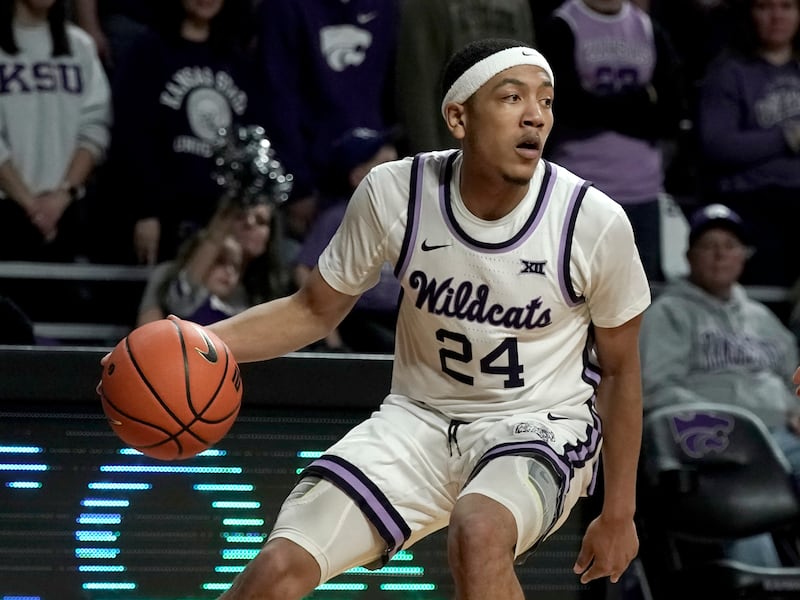OK, it’s official: College sports is a mess. We have seen the future and it is not a pretty sight.
The creation of the NIL rule (name, image, likeness) and the transfer portal are analogous to the creation of the internet and smartphones: They seemed like a great idea at the time, but we weren’t sure where it would lead.
Now we know — or have a much better idea. Nijel Pack, a Kansas State guard, entered the transfer portal and a week ago signed with Miami. Later it was learned that he had signed a two-year, $800,000 NIL offer from Miami’s billionaire booster, John Ruiz. So, Pack will receive $400,000 per year plus a new car. He sold his skills to the highest bidder.
Remember when this was called cheating? Not anymore. It’s all legal.
Pack’s new teammate, Isaiah Wong, who had signed an NIL deal with Ruiz’s company, LifeWallet, suddenly wasn’t happy with his deal after learning of Pack’s offer. He threatened to leave Miami and enter the transfer portal unless his NIL deal was increased. Wong wanted more money or else.
Wong’s agent told ESPN, “If Isaiah and his family don’t feel that the NIL number meets their expectations they will be entering the transfer portal tomorrow, while maintaining his eligibility in the NBA draft and going through the draft process.”
Wong later backtracked and said he will not enter the transfer portal. ESPN’s Dan Murphy reported that Ruiz will help Wong find more NIL deals with other companies in Miami. So, Wong got what he wanted and athletes can hold universities hostage.
The whole episode demonstrated that college athletics is headed for big trouble. It exposed — again — the many flaws in both the NIL rule and the transfer portal.
As a result, the NIL rule means the rich are going to get richer — because they can offer more money, they can not only attract even more blue-chip recruits but they can steal players from other schools; the transfer portal facilitates the process, allowing them to transfer once without having to sit out a season as was previously required. Let the bidding begin.
Free agency has come to the college game, and the line between professional sports and college sports is becoming almost nonexistent. What’s next, holdouts?
The creation of the NIL rule (name, image, likeness) and the transfer portal are analogous to the creation of the internet and smartphones: They seemed like a great idea at the time, but we weren’t sure where it would lead.
This wheeling and dealing for talent might be considered fair play in the business world — although even businesses have noncompete clauses — but not in sports. As noted many times here previously, college athletes now have more freedom of movement from team to team than professional players. To maintain any level of competitive balance, it is necessary to have some restrictions in player movement; otherwise, you end up with the NBA.
The whole college football/basketball model is upside down and it’s been headed here for decades, ever since TV (and its money) entered the game. Universities have become football and basketball franchises with a little education on the side. FBS football coaches are paid an average of $2.7 million in salary. The highest paid employee in each state is often a college coach. There are 20 college basketball coaches who are paid between $3.5 million and $10 million per year.
Football Scoop researched the 25 highest paid university presidents and compared their salaries to their football coaches — 16 of the coaches made more money than their school’s president (two of the other schools don’t have football teams). Now there will be athletes who are paid more than their presidents. Alabama quarterback Bryce Young reportedly has deals worth nearly $1 million in NIL pay.
Wong and Pack are good, but not great players, yet both were able to command big NIL deals.
Wong averaged 15.3 points per game last season and was named to the All-ACC third team. He is considered a borderline NBA prospect. Pack is a 6-foot guard who averaged 17.4 points per game as a sophomore last season on a team that won only 14 games. He was selected first-team All-Big 12. He declared for the NBA draft a month ago, but apparently changed his mind, perhaps because, ironically, he can make more money by staying in the college game.
Big changes are coming. The rich will break away soon and create their own football conference separate from the current FBS arrangement — perhaps a supersized SEC — and they’ll eventually pay players salaries via NIL deals. Then there will be calls for NFL-like revenue sharing and contracts and free agency and drafts. And the line between the pros and collegians could grow very thin.


